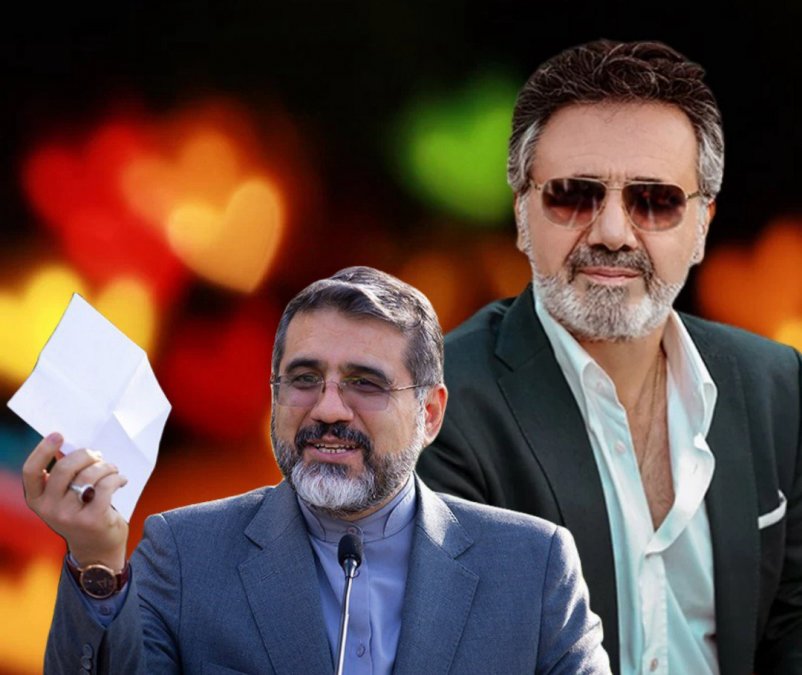Ovin is waiting for Moein.
Route 33 Bridge passes through Ovin.
Ovin is waiting for Moein. On Wednesday, 19th of Dey month, the news of the conviction of Mehdi Yarrahi, a famous pop singer, to two years in prison and 74 lashes was released. And one day after that, the Minister of Cultural Heritage and Tourism of Iran announced that the doors are going to be opened to Iranians so that millions of Iranians can enter the country safely and easily.
On the same day, a reporter mentioned the name of Nasrollah Moein, a famous Iranian singer abroad, in a possibly targeted manner and asked if Moein can return to Iran and hold a concert. Mohammad Mehdi Ismaili responded positively and spoke openly about granting permission for this singer to hold a concert, saying that he may also be given permission to operate. He added that he will follow the legal process to obtain the permit, just like other singers.
It is not clear how the name Moein has been mentioned among international readers. Perhaps it is because Mr. Moein reacted to the explosions in Kerman last week and posted a black image with the caption ‘Condolences to Kerman’ on his Instagram page. However, when it comes to legal procedures, it seems that the law has another side as well. Mohsen Barahani, a legal expert and university professor, predicted based on legal provisions that if the law is enforced, Mr. Moein could face a minimum of 28 years in prison.
Mr. Esmaeili has spoken several times in the past two years about the possibility of artists returning. In an interview with Iran newspaper in February of last year, he said that all artists who have left and even those who have occasionally taken a stance can return to the embrace of the people and the system, as long as they are willing to serve the people. Even if they have made mistakes in the past, they are still welcome.
The recent video of the Minister of Culture and Islamic Guidance, which was published through the Young Journalists Club affiliated with the Political Deputy of the Islamic Republic of Iran Broadcasting, has faced widespread reactions on social networks. Many users, referring to the government’s track record, interpreted it as deliberate manipulation or courageous manipulation of such issues on the eve of the elections. One user even wrote, ‘By hearing the Minister of Guidance’s words, I remember my father standing at the door, wearing a belt, saying, ‘I don’t care about your business.’
Whenever the issue of the return of Iranians living abroad to Iran is discussed, the names of artists, writers, and well-known individuals who have been expelled from Iran for years are mentioned. Every year, news of the mysterious deaths of well-known Iranian figures abroad is also published. In the first six months of 2022, five distinguished Iranian writers and poets, including Reza Baraheni, Houshang Ebtehaj, and Abbas Maroufi, passed away far from their homeland.
Executive and judicial officials are promising to open Iran’s borders to artists, specifically mentioning the well-known actor Behrouz Vosoughi, who has been mentioned multiple times in the past decade for his desire to return to the country. Domestic artists have repeatedly called for Vosoughi’s return by signing petitions. However, the Attorney General of Iran, in response to the filmmakers’ request on June 5, 2018, accused Vosoughi of engaging in a widespread corruption campaign, which was initiated by artists, and stated that they are aware of his current activities.
The longing and regret of returning to one’s homeland has been depicted in numerous films. One such documentary, ‘Salamie Digar’ directed by Hossein Khandan, was made about twenty-three years ago in 2000. It is a documentary about the meeting between Khosrow Shakibaei, a prominent Iranian actor, and Behrouz Vosoughi on March 27, 2003, July 19, 2008.
Before meeting Behrouz Vosoqi, Khosrow Shakibaei visits the residence of Sohrab Shahid-Saless, a prominent and avant-garde Iranian filmmaker, in Chicago and regrets that if only Shahid-Saless were alive, he would have had the opportunity to see him. Shakibaei expresses that dying alone is very painful and unfair. He believes that if he were to call Shahid-Saless’ home now, he would never answer the door. Shahid-Saless was one of the heroes of his life, but he always arrived late, just like this time. This time, Shakibaei stayed behind and regretted not being able to meet Mr. Shahid-Saless in July 1998 when he passed away. The documentary ‘Salam, Another Greeting’ was broadcasted about a decade after its production, when Khosrow Shakibaei had also passed away.
Alongside artists who yearn or yearned to visit Iran, there were also artists like Mohammad Kheradmand, a dancer, and Habib Mohabian, a famous singer known as Habib, who traveled to Iran and faced media attention. Mohammad Kheradmand went to Iran in 2002 to visit his family and was detained upon leaving the Tehran airport. He spent 21 days in solitary confinement in Evin prison and never returned to his country after leaving Iran.
Habib, a famous and beloved old pop singer, also went to Iran with a green light and promises from Mahmoud Ahmadinejad’s government. He had trouble with his artistic activities and was arrested. He was not given official permission to work. The sudden news of his death in Khordad month of 1395 was very shocking, and the media wrote that the lonely night man had passed away. During this period, there were also talks of Moein’s trip to Iran, but according to Moein, such a trip did not materialize.
Furthermore, on the third of Bahman month in 1398, Iranian media reported that Amir Arjang Kazemi, also known as Saman, who had been a singer in Los Angeles for a while, was arrested while performing at restaurants in northern Tehran. Apart from the fate of people like Habib Mohabbian, who usually make headlines, the travels of famous and special individuals are not usually covered by the media. According to Mohammad Kheradadian, security officials had asked him to keep his trip secret and away from the media’s eyes.
The story of the return of artists from abroad to Iran is a double-edged sword. Whenever their memory is mentioned, the story of artists inside Iran is also brought up. These are artists who were deprived of artistic activities without any trial or solid reason after the Islamic Revolution. They were referred to as singers or Persian film actors to belittle them. The film ‘Motrebb’ directed by Mostafa Kiayi in Azar 1398 is an example of dozens of stories of artists who were forced to leave Iran or remained in Iran and died longing to return to work.
Parviz Parastui, a cinema actor, had said about the reason for his role in the film ‘Motrebb’ that he accepted it because of Abbas Ghaderi. He had witnessed Mr. Ghaderi being whipped for singing in the courthouse during the 1990s, and I tried to prevent it but couldn’t.
The Sazandegi newspaper, affiliated with the Development Coordinators Party, on Friday, 20 Dey month, dedicated its front page to the issue of Moein’s return to the country, asking why conservative governments are pursuing Los Angeles singers while neglecting artists like Shajarian, Golpa, and Bimohali.
The statements of government officials regarding the entry of Iranians living abroad are not new. After the end of the first war, signs of Iranians’ desire to return to the country and the reciprocal interest of some Iranian officials in facilitating their return began. In 1369, when Sadegh Kharazi, Iran’s representative at the United Nations, proposed a plan to attract Iranians living abroad during the government of Akbar Hashemi Rafsanjani, the Supreme Council of Iranians Abroad was established as a department in the Ministry of Foreign Affairs in 1370. After several decades, the government announced this year on 24 Tir month that it has sent a bill to support Iranians living abroad to the parliament.
Officials from the Iranian Ministry of Foreign Affairs say that five million and one hundred thousand people outside of Iran are in contact with the consulates of the Islamic Republic, despite the media propaganda launched by government officials and the judiciary this week about the return of Iranians living abroad. Many Iranians, both inside and outside the country, still remember the words of Ali Khamenei on the 21st anniversary of the death of Ruhollah Khomeini on the 12th of Khordad month, 1397, in which he referred to the founding charter of the Islamic Republic regarding the return of communists to Iran. He said, ‘Come back to the country and endure the punishment that the law and justice impose on you, and be punished.’
In other words, come and endure execution, imprisonment, or other punishments in order to save yourself from divine punishment and divine retribution. If you don’t have the courage to do even that, at least don’t be a pawn for the powerful and the oppressors of the system.


